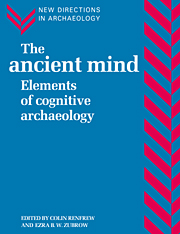Book contents
- Frontmatter
- Contents
- List of figures
- List of tables
- List of contributors
- Preface
- PART I INTRODUCTION
- PART II THE INTERDISCIPLINARY UNDERPINNING
- PART III APPROACHES TO CULT PRACTICE AND TRANSCENDENTAL BELIEF SYSTEMS
- PART IV PREHISTORIC CONCEPTIONS OF SPACE AND TIME
- PART V THE MATERIAL BASIS OF COGNITIVE INFERENCE: TECHNOLOGY
- 13 Cognitive aspects of ‘technique’
- 14 Mindful technology: unleashing the chaîne opératoire for an archaeology of mind
- 15 Prehistoric technology: a cognitive science?
- PART VI THE MATERIAL BASIS OF COGNITIVE INFERENCE: WRITING SYSTEMS
- PART VII CONCLUSION
- Index
13 - Cognitive aspects of ‘technique’
Published online by Cambridge University Press: 03 December 2009
- Frontmatter
- Contents
- List of figures
- List of tables
- List of contributors
- Preface
- PART I INTRODUCTION
- PART II THE INTERDISCIPLINARY UNDERPINNING
- PART III APPROACHES TO CULT PRACTICE AND TRANSCENDENTAL BELIEF SYSTEMS
- PART IV PREHISTORIC CONCEPTIONS OF SPACE AND TIME
- PART V THE MATERIAL BASIS OF COGNITIVE INFERENCE: TECHNOLOGY
- 13 Cognitive aspects of ‘technique’
- 14 Mindful technology: unleashing the chaîne opératoire for an archaeology of mind
- 15 Prehistoric technology: a cognitive science?
- PART VI THE MATERIAL BASIS OF COGNITIVE INFERENCE: WRITING SYSTEMS
- PART VII CONCLUSION
- Index
Summary
Introduction
In trying to isolate reasons for the fact that archaeology has, for so long, ignored the cognitive aspects of material culture studies, one can point to the following - not necessarily in order of appearance or importance:
- The once dominant determinist streak in archaeology often saw ‘us humans’ as forever trying to adapt to circumstances beyond our control. This attitude has wilfully ignored the reciprocal nature of the relationship between people and what surrounds them, which is at the core of cognition (see below), and has underrated the impact of long-term human activity on the material and natural world, the degree to which human beings have created their surroundings by direct action or selection.
- The predominant evolutionary perspective underwrites a strong theoretical sense of common origins and has led archaeologists to look for, and stress, human universals, both physical and cultural. At first sight, this conflicts with the importance of observed variations, and this apparent conflict has led to a yes-or-no debate on the existence of such universals, for example in material culture. The debate has precluded a more nuanced position, which would entail investigating whether similar processes might underlie very different results.
[…]
Information
- Type
- Chapter
- Information
- The Ancient MindElements of Cognitive Archaeology, pp. 135 - 142Publisher: Cambridge University PressPrint publication year: 1994
Accessibility standard: Unknown
Why this information is here
This section outlines the accessibility features of this content - including support for screen readers, full keyboard navigation and high-contrast display options. This may not be relevant for you.Accessibility Information
- 10
- Cited by
